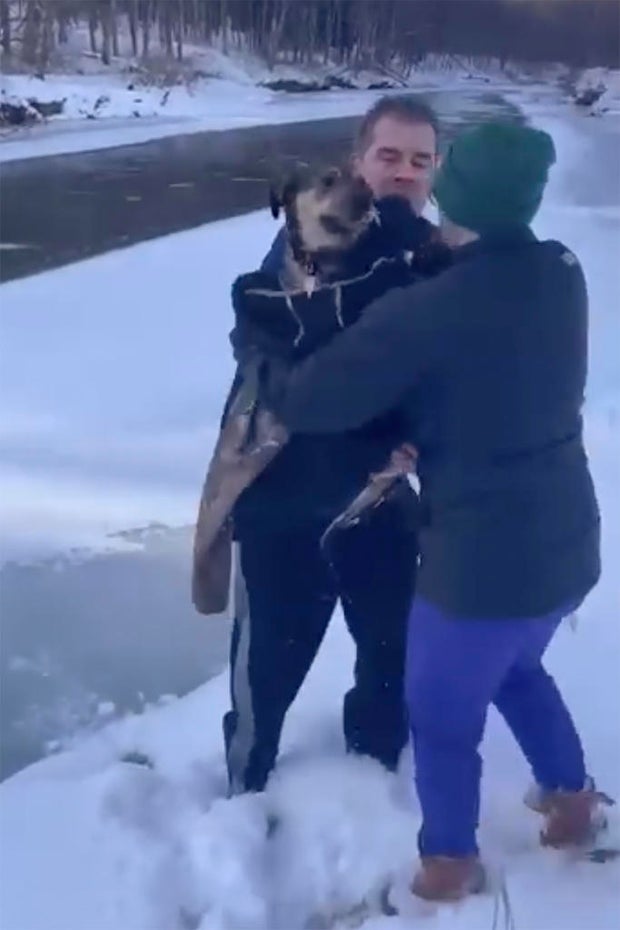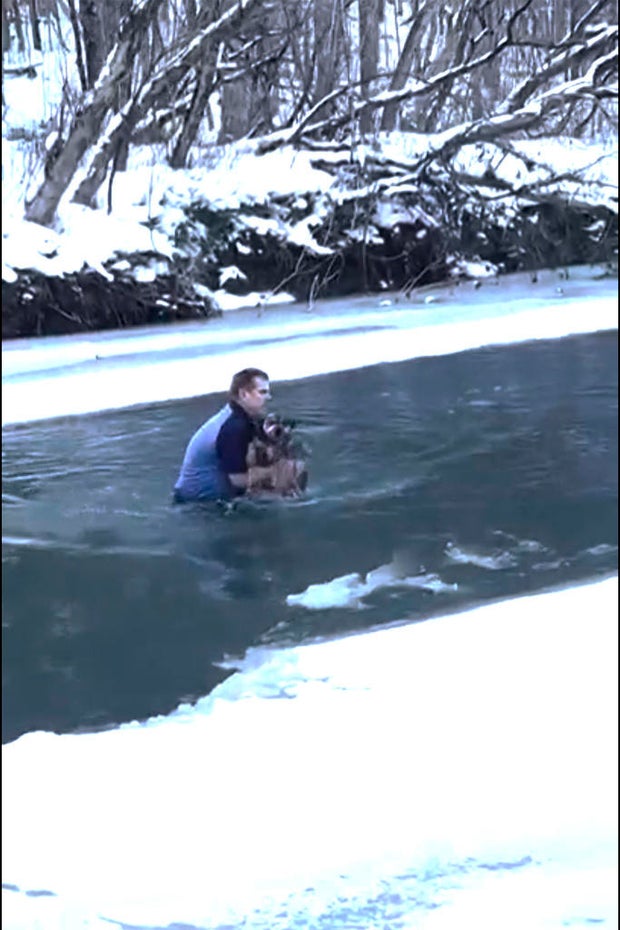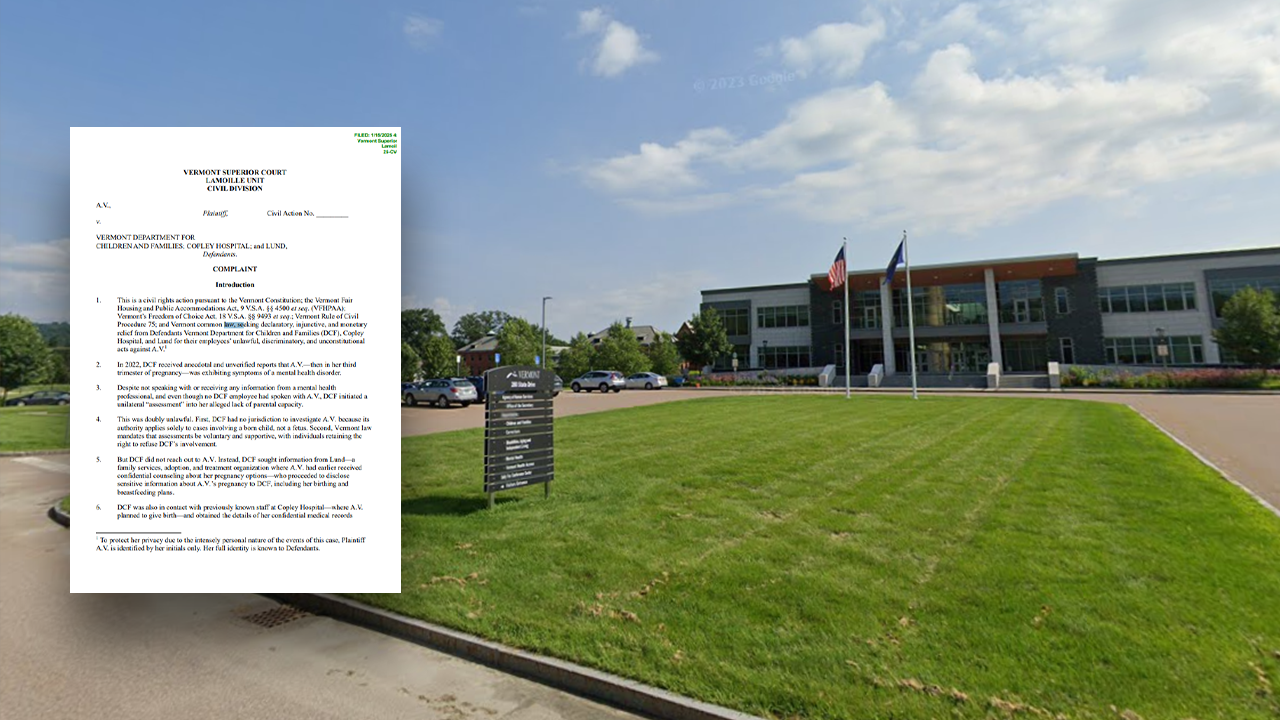A lawsuit filed this week accuses Vermont’s child welfare agency of using baseless allegations about a pregnant woman’s mental health to secretly investigate her and win custody of her daughter before the baby’s birth.
The ACLU of Vermont and Pregnancy Justice, a national advocacy group, filed the lawsuit on Wednesday against the Vermont Department for Children and Families, a counseling center and the hospital where the woman gave birth in February 2022.
In the lawsuit, the state also faces accusations that it routinely tracks pregnant women deemed unsuitable to be mothers.
The lawsuit asks for unspecified monetary damages for the woman, who is identified only by her initials, A.V., and an end to what it describes as an illegal surveillance program.
PREGNANT WOMAN AND BABY SAVED AFTER DOCTORS FIND GRAPEFRUIT-SIZED TUMOR: ‘EXTREMELY RARE’
A copy of the lawsuit seen against the the Vermont Department for Children and Families. (Google Maps; Vermont Superior Court)
The director of a homeless shelter where A.V. stayed in January 2022 told the child welfare agency that she appeared to have untreated paranoia, dissociative behaviors and PTSD, according to the lawsuit. The state began investigating and eventually spoke to the woman’s counselor, midwife and a hospital social worker without her knowledge, even though it had no jurisdiction over fetuses.
The woman remained unaware of the probe until she gave birth and her daughter was immediately taken away, according to ACLU senior staff attorney Harrison Stark.
A.V. had no knowledge that hospital officials were giving updates to the state while she was in labor, including details of her cervix dilation, and that she had lost temporary custody of her baby. The state even sought a court order forcing the woman to undergo a cesarean section, although it was rendered moot because she agreed to the surgery.
The woman was not able to win full custody of her child until seven months later.
“It’s a horrific set of circumstances for our client,” Stark said. “It’s also clear from what has happened that this is not the first time the agency has done this. We have learned from several confidential sources that DCF has a pattern and practice of looking into folks like our client who are pregnant, who are of interest to the agency based on a set of unofficial criteria and who the agency is tracking on what is called a ‘high risk pregnancy docket’ or ‘high risk pregnancy calendar.’”
Department for Children and Families commissioner Chris Winter said the agency will not comment until officials have reviewed the lawsuit and investigated its accusations.
“We take our mission of protecting children and supporting families seriously and work hard to balance the safety and well-being of children with the rights of parents,” he said.
Officials at Lund counseling center, which was named as a defendant, said they learned of the allegations from news reports.
The ACLU of Vermont and Pregnancy Justice filed the lawsuit on Wednesday against the Vermont Department for Children and Families, a counseling center and the hospital where the woman gave birth. (Getty Images )
“We take these matters very seriously and we are actively working to gather more information to understand the situation fully,” interim CEO Ken Schatz said.
Copley Hospital has not commented on the lawsuit.
Several states across the country allow the civil commitment of pregnant women to take custody of a newborn, Pregnancy Justice senior staff attorney Kulsoom Ijaz said. However, it is unclear how common these situations are in the U.S.
Ijaz said what happened to A.V. shows how pregnancy is increasingly used as a justification to block people’s rights.
The organization released a report in September detailing an increase in women being charged with pregnancy-related crimes in the year after the U.S. Supreme Court overturned Roe v. Wade, allowing states to make their own laws regarding abortion. Most of those cases, in which the baby was listed as the victim, included women charged with child abuse, neglect or endangerment over allegations of substance use during pregnancy.
SMOKING AND VAPING HAVE THESE DETRIMENTAL EFFECTS ON FERTILITY, DOCTORS WARN
This photograph shows the logo of the American Civil Liberties Union. (KAREN BLEIER/AFP via Getty Images)
CLICK HERE TO GET THE FOX NEWS APP
“What DCF did here is incredibly cruel,” Ijaz said. “It’s discriminatory. Its state sanctioned surveillance and stalking, and it violates Vermont’s newly enshrined right to reproductive autonomy in its state constitution. This is an opportunity for Vermont to signal to other states, as a leader, and say that these rights don’t just exist on paper. They exist in practice, too.”
Stark said the allegations in Vermont are particularly troubling since the state has described itself as a haven for reproductive rights.
“To discover evidence that a state agency is essentially colluding with certain medical providers to collect information without folks’ knowledge or consent and expanding its jurisdiction unlawfully to investigate folks based on what are essentially decisions about their own reproductive health is incredibly alarming,” he said.
The Associated Press contributed to this report.

/cloudfront-us-east-1.images.arcpublishing.com/gray/VE5JZGLOMZCDBP4RFGNRIKNBSA.jpg)



























/cdn.vox-cdn.com/uploads/chorus_asset/file/25822586/STK169_ZUCKERBERG_MAGA_STKS491_CVIRGINIA_A.jpg)

/cdn.vox-cdn.com/uploads/chorus_asset/file/23935558/acastro_STK103__01.jpg)

/cdn.vox-cdn.com/uploads/chorus_asset/file/25826211/lorealcellbioprint.jpg)
/cdn.vox-cdn.com/uploads/chorus_asset/file/25832751/2192581677.jpg)

/cdn.vox-cdn.com/uploads/chorus_asset/file/25835602/Switch_DonkeyKongCountryReturnsHD_scrn_19.png)